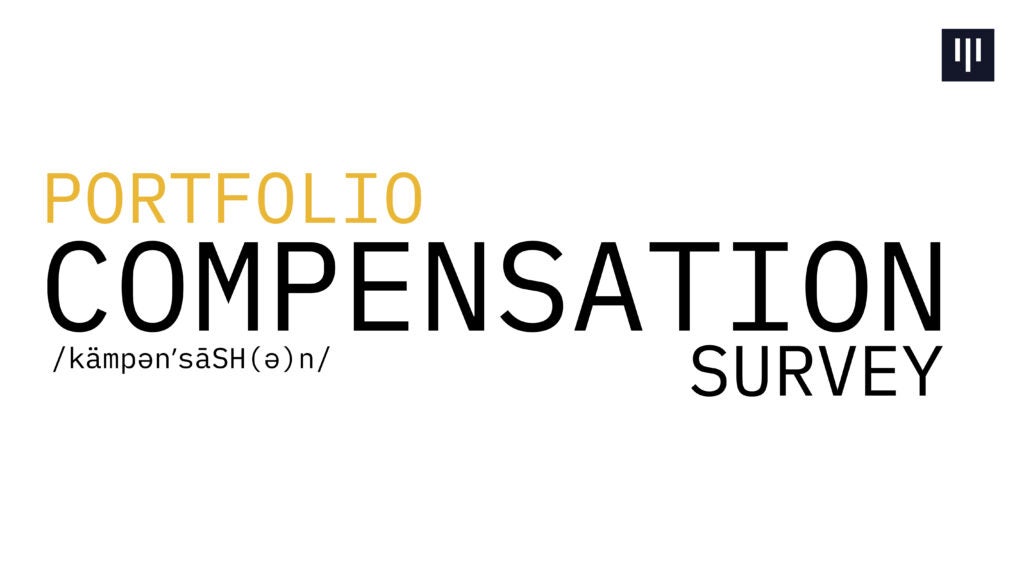[SBF going from industry darling to Bahamian inmate in a few weeks is such an unprecedentedly fast series of wild events that it’s difficult to do my day job and keep our investor letter draft current. So, I’m just gonna SEND it. Some text might be hours out of date by the time you get this!]
Dear Investors[1],
After the previous high-profile blowup in the summer we titled our Blockchain Letter:
DeFi Worked Great
DeFi is still working great. Now it’s time for the sister letter:
Regulated Exchanges Worked Great
Before we get to regulated exchanges and other material, I wanted to share some thoughts on the FTX fraud. A lot of the press is a version of this:
“If you can’t trust FTX who **can** you trust?!?!”
This is typically followed by:
“Blockchain is a failure.”
The narrative that blockchain skeptics and some regulators and politicians are pumping out misses the point. The collapse of FTX had nothing to do with blockchain technology. It’s not crypto that failed. Bitcoin and all the other protocols worked perfectly.
“This is really old-fashioned embezzlement. This is just taking money from customers and using it for your own purpose, not sophisticated at all.”
— FTX’s new CEO, John Ray, Wall Street Journal, December 13, 2022
On December 12, Sam Bankman-Fried was arrested by Bahamian authorities on behalf of the U.S. Attorney’s Office of the Southern District of New York (SDNY), after a month of uncertainty. The charges could include wire fraud, securities fraud, money laundering, and related conspiracy charges.
“Prosecutors say Mr. Bankman-Fried ‘engaged in a scheme to defraud customers of FTX.com by misappropriating those customers’ deposits.’ The money was diverted to Alameda Research, SBF’s crypto hedge fund. The indictment alleges he defrauded lenders as well, and prosecutors also threw in a campaign-finance violation for excessive political donations made ‘in the names of other persons.’
“The SEC complaint is more voluble. ‘From the inception of FTX, Bankman-Fried diverted FTX customer funds to Alameda,’ it says, to the point that “’here was no meaningful distinction.’ Then SBF ‘used Alameda as his personal piggy bank to buy luxury condominiums, support political campaigns, and make private investments.’ He took enormous loans, ‘including two instances in which Bankman-Fried was both the borrower in his individual capacity and the lender in his capacity as CEO of Alameda.’
“Mr. Bankman-Fried claimed Alameda had no special privileges on the FTX platform. Yet the SEC says his hedge fund was granted a ‘virtually unlimited’ credit line and was exempt from the ‘automated risk mitigation protocols’ that SBF trumpeted as ensuring FTX’s stability. The mixing of funds was obfuscated in internal accounts. The beginning of the end arrived when crypto prices fell and ‘many of Alameda’s lenders demanded repayment of loans.’ ”
— Wall Street Journal, ‘Sam Bankman-Fried’s Crypto Crash‘, December 13, 2022
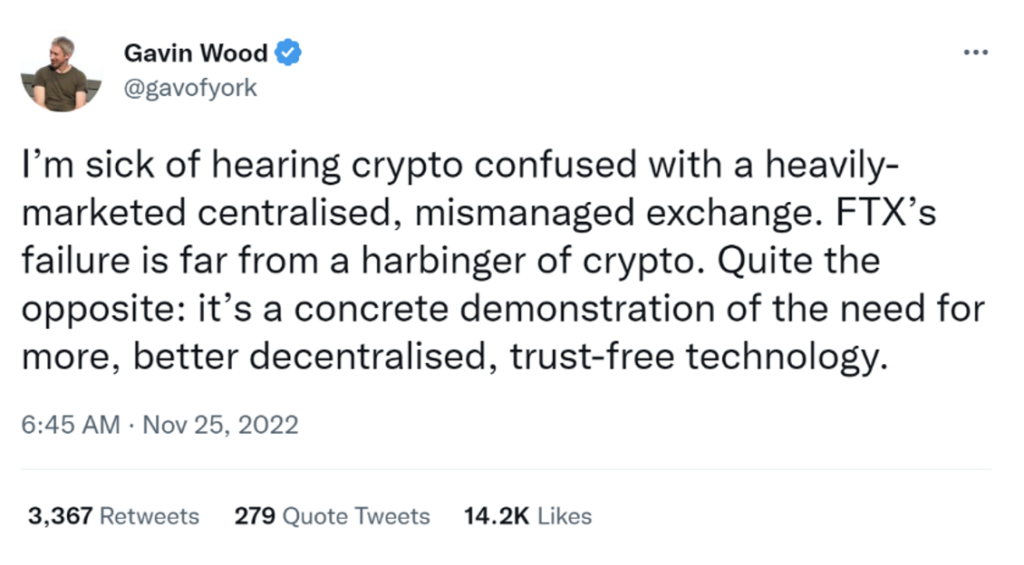
In most respects this is comparable to Three Arrows Capital, Celsius, BlockFi, and Voyager. Centralized, opaque, un-audited, and/or offshore entities with way too much leverage blowing up. With the general market down -70% and some specific things like Grayscale’s Bitcoin Trust (GBTC) trading at a 49% discount to the bitcoin in the trust, it’s not surprising that leveraged entities would struggle.
Details are still emerging, but the FTX collapse involved massive conflicts of interest and, apparently, fraud. This pattern is as old as time. Traders, when confronted with a small problem, trying to trade out of it and creating a massive problem. When the forensic accountants are done, we may learn that FTX/Alameda was bankrupt earlier than is publicly known. We estimate that the loss would have been much, much smaller had they filed Chapter 11 back then.
“IF YOU CAN’T TRUST FTX WHO **CAN** YOU TRUST?!?!”
The two-pronged answer is:
Regulated exchanges worked great – such as Coinbase and Bitstamp
DeFi worked great, specifically DEXs – such as Uniswap, 0x, 1inch, Balancer, and DODO
FTX had nothing to do with the promise of blockchain. Blockchain didn’t fail. Business is just moving back to safe entities.
REGULATED EXCHANGES WORK GREAT
We have exchanges that have been around for a long time, that are transparent, audited, and regulated. The answer’s already here. There are all kinds of crypto detractors and skeptical regulators that are talking about the need for some totally different future of blockchain trading, but it’s already here, and it’s been here for a long time. There are exchanges like Coinbase, Kraken, and Bitstamp that, when a client sends money to them, they just put it in a bank. The solution is pretty straightforward. The obvious trade here is it’s going to come back to regulated exchanges.
There’s now talk of high-tech “proof of reserves”, but that only tells you part of the story. Proof of some of the assets on the balance sheet but nothing of the liabilities. The answer is really simple: you hire a Big Four auditing firm, you prove that you not only have the assets, but you prove that you don’t have liabilities that exceed your assets.
There’s nothing new to this. Pantera engaged Ernst & Young to do the first audit of any crypto entity nine years ago.
As a sign of how far understanding of blockchain has come – to complete the audit I had to spend my New Years Eve in the office with the very nice EY partner. I had to prove that I controlled the bitcoins just before midnight and also just after. We were on the 41st floor of our office building on San Francisco Bay – fireworks exploding right at our level. Quite beautiful, but totally misses the point of blockchain. If I could move them at noon on a weekday before New Years – anybody on their team could confirm with a public blockchain explorer that the bitcoins were still in the same account after the New Year’s weekend. I’m happy that understanding has increased.
I was chairman of Bitstamp for many years. Four years ago, Ernst & Young again was hired to do an audit of Bitstamp. That is all you need.
Deloitte audits Coinbase. If you store crypto on an exchange please use one with an external auditor.
Regulated, transparent, onshore, and/or audited exchanges are seeing a dramatic increase in market share. This is essentially getting back the customers who fled to offshore exchanges for more assets/potentially unregistered securities offered to trade, more leverage, and lower fees. Since October, the market share of exchanges like Coinbase, Kraken, Upbit, and Bitstamp has increased 27 percentage points.
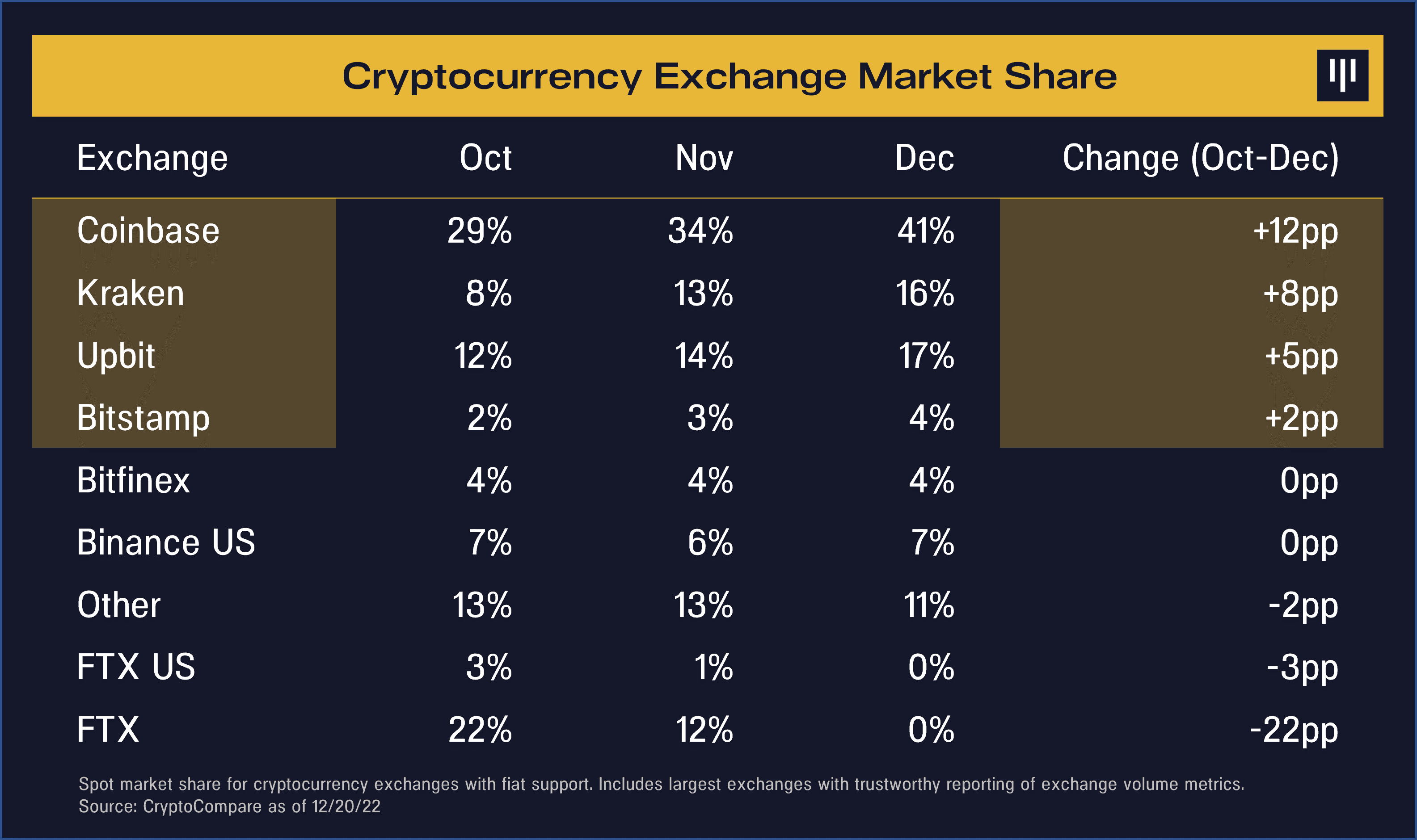
I think that trend continues. I hope it continues. It would be great for our industry. It would have been great if everyone had been using exchanges like these over the last couple of years.
“Based on our review over the past week, we are pleased to learn that many regulated or licensed subsidiaries of FTX, within and outside of the United States, have solvent balance sheets, responsible management, and valuable franchises.”
— FTX’s new CEO, John Ray, FTX Press Release, November 19, 2022
This is a massively important point: even an alleged criminal like Sam Bankman-Fried (aka SBF) didn’t (and appears couldn’t, although details are still emerging) loot the regulated exchanges in the FTX empire. Even with all the craziness and alleged fraud that happened at FTX, they did not (or weren’t able to) loot the U.S.-regulated FTX subsidiary, LedgerX. That is such a powerful symbol of why sensible regulation is good for our industry – it protects investors, it has disclosures and transparency.
![]()
WHAT NOW?
Prior to the FTX implosion, my intuition had been that the worst was over for the price of blockchain assets. It seemed like the excessive leverage that centralized lenders could not sustain must have played out over May and June.
It seemed as though there was no way for additional, similarly-leveraged entities to avoid bankruptcy for six more months. It now seems that I have to caveat that statement: no legal way to avoid bankruptcy for that long. When the dust settles, it seems likely we’ll find out that FTX/Alameda was bankrupt months earlier than publicly known. If so, everything since then was just criminal.
After I drafted that paragraph a couple of weeks ago, SBF decided to do another interview (doesn’t he have a lawyer?!?!) in which he admitted that they were bankrupted during the TerraLUNA crash in May.
Kelsey: “Was the Alameda thing when LUNA crashed the first time customer deposits got lent out (that’s what people are saying) or was it more like, the accounting was such that a lot of the stuff you were doing was implicitly backed by customer deposits?”
SBF: “Messy accounting + margin exchange position built up over time, though in retrospect LUNA crash was when a lot of it did. But messy accounting I didn’t realize full size of it until a few weeks ago.”
— Vox’s Kelsey Piper Interview with Sam Bankman-Fried, November 16, 2022
He did a big media tour since then and next week he’s testifying – under oath – before the United States House of Representatives. You’d think with two law school professors as parents, he’d have heard of the Fifth Amendment to the U.S. Constitution.
“In the FTX bankruptcy filing, they published a list of the top 50 creditors, and they owed $3.1 billion. The tax filings also reveal that FTX and Alameda Research lost $3.7 billion between 2019 and 2021. So, even in the bull market, they were effectively losing massive amounts of money. It’s really unclear exactly when the fraud and theft started to occur, but it seems like it was possibly even earlier than people previously thought.”
— Joey Krug, Pantera Co-CIO, Special Call :: The FTX Fallout, December 9, 2022
It’s wild to **know** that you’re bankrupt in May (as SBF implied in the Vox interview) and to continue to advertise for client deposits, raise money, steal your clients’ money…AND go on TV, podcasts, and to lobby the United States Congress. Truly unbelievable, if true.
Kelsey: “So there was no point of like ‘let’s lend out customer deposits’, just various financial instruments that ended up adding up to that and you didn’t even see they’d added up to that?”
SBF: “Yeah. . . like, ‘oh FTX doesn’t have a bank account, I guess people can wire to Alameda’s to get money on FTX. . . three years later. . . ‘oh fuck it looks like people wired $8b to Alameda and oh god we basically forgot about the stub account that corresponded to that and so It was never delivered to FTX’ “
— Vox’s Kelsey Piper Interview with Sam Bankman-Fried, November 16, 2022
Jesse Powell said it so well:
“I’m really trying to control my rage. This isn’t about aiming high and missing. This is about recklessness, greed, self-interest, hubris, sociopathic behavior that causes a person to risk all the hard-won progress this industry has earned over a decade, for their own personal gain.”
— Jesse Powell, Kraken Co-Founder, Twitter, November 10, 2022
![]()
U.S. PRESENCE :: CRYPTO REGULATION VS. INTERNET REGULATION
The state of crypto-asset regulation is the polar opposite of the rest of the internet.
The U.S. government literally built the internet (ARPANET which will celebrate the 50th anniversary of TCP/IP next year). The U.S. government then empowered early internet companies with a myriad of Congressional advantages. In particular, the U.S. gave them safe harbor against regulation and provided an 8.25% discount versus their brick-and-mortar competitors via no sales tax. The result is that all of the largest internet companies in the world are in the United States or essentially Chinese copies.
So far in the blockchain era, the U.S.’ regulatory approach has had the opposite effect. It has encouraged 95% of blockchain trading to move offshore. Similarly, 95% of the market cap of blockchain protocols are in projects domiciled outside of the United States.
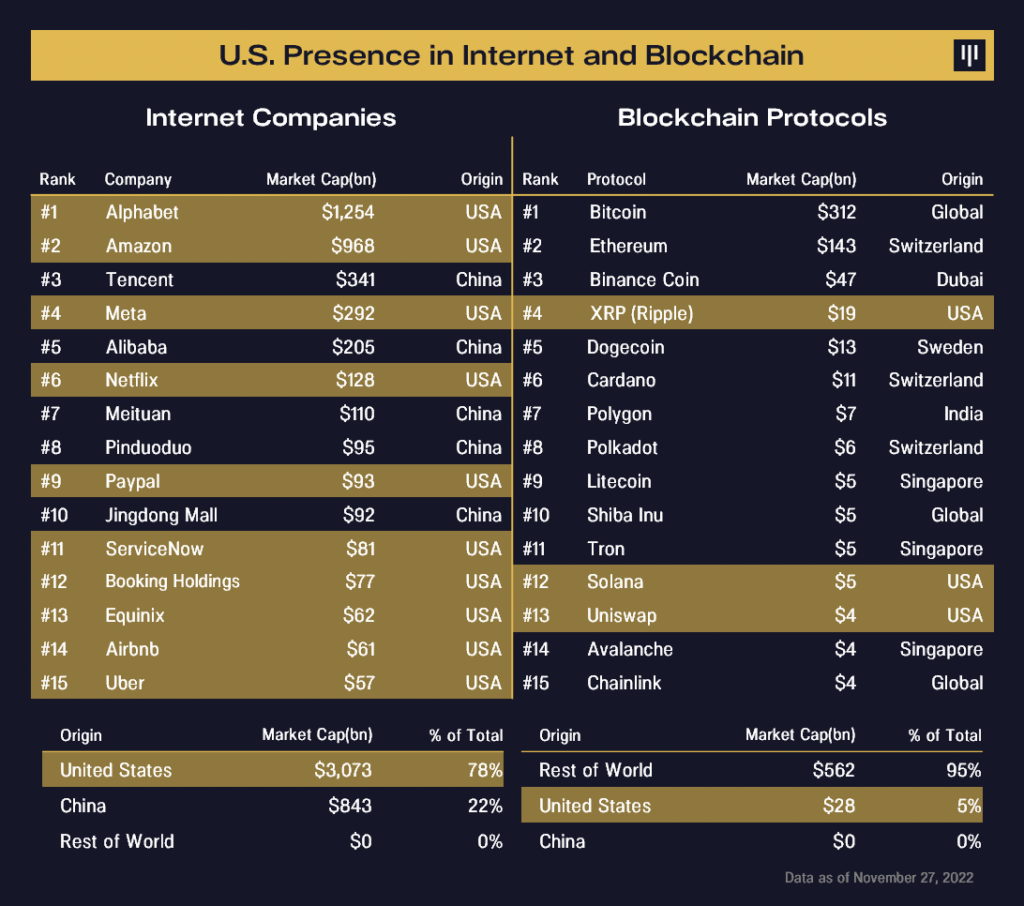
![]()
THE REGULATORY BLACK HOLE[2]
CFTC Chairman Rostin Behnam pointed out something that is absolutely fascinating. There is a regulatory black hole on the proactive regulation of spot bitcoin exchanges. It’s a really, really weird kink in the U.S. regulatory system where the CFTC has very clear jurisdiction over anything that’s a derivative or a future. And then it has the ability to bring enforcement actions in the underlying spot commodities markets if it sees problems. But it doesn’t have the ability to regulate spot commodities markets.
What about the SEC? Obviously, the “S” in SEC is “securities”, so it can only regulate things that are securities. Although the SEC hasn’t said what is and isn’t a security, it is commonly thought that bitcoin is not a security. If it’s not a security then it must be a commodity. So that would leave this really weird black hole in regulation where there isn’t a U.S. agency that is empowered by Congress to regulate spot Bitcoin exchanges.
“Since 2014, we have brought sixty odd cases in crypto. However, since we don’t have direct oversight, we are burdened by the fact that we have to wait for individuals to come to us and say, ‘hey, you should check out this issue that we’ve identified’ or ‘I’ve been defrauded’.
“Every case we’ve brought is because of information that’s come to us and that’s not traditional in what you would want or expect from a market regulator.
“You want to use surveillance tools, the oversight authority to be surveilling the market in real time and identifying these trading anomalies, having registered entities, making sure they’re not combing linked funds, no conflicts of interest, they have books and records that you can examine, they have financial resources etc. All of these core elements of financial market structure.”
— Chairman Rostin Behnam, CFTC, Princeton DeCenter Inaugural Summit, November 30, 2022
“There is a growing appetite for crypto, but major gaps in the regulation. I’ve been very vocal in my warnings that we have a largely unregulated market and that we need to have comprehensive regulatory reform over the crypto market.”
— Chairman Rostin Behnam, CFTC, Princeton DeCenter Inaugural Summit, November 30, 2022
“These are real, tangible events where constituents and customers and investors and Americans are getting hurt. We can’t stay on the sidelines.
“Blockchain lending, custody, markets, tax policy, etc., are core questions that the new Congress is going to have to grapple with. It’s going to be an uphill battle, but folks will be pretty determined to get something done.
“There is so much possibility, and I don’t mean that in a positive or negative way, with this technology. I think it is so important that we collectively think about what are the risks and what are the opportunities – and having objective, thoughtful, deliberative conversations about the technology and what role governments, agencies, and regulators should play.
“It’s obviously extremely unfortunate what’s occurred in the past few weeks. I hope these events act as a springboard to act quickly and in a comprehensive way. I fear it’s just going to happen again if we don’t do something quickly. I’ll continue to advocate – it’s just too important not to act right now, because we can’t risk another bankruptcy occurring in the near future.”
— Chairman Rostin Behnam, CFTC, Princeton DeCenter Inaugural Summit, November 30, 2022
![]()
PRESS FAWNING
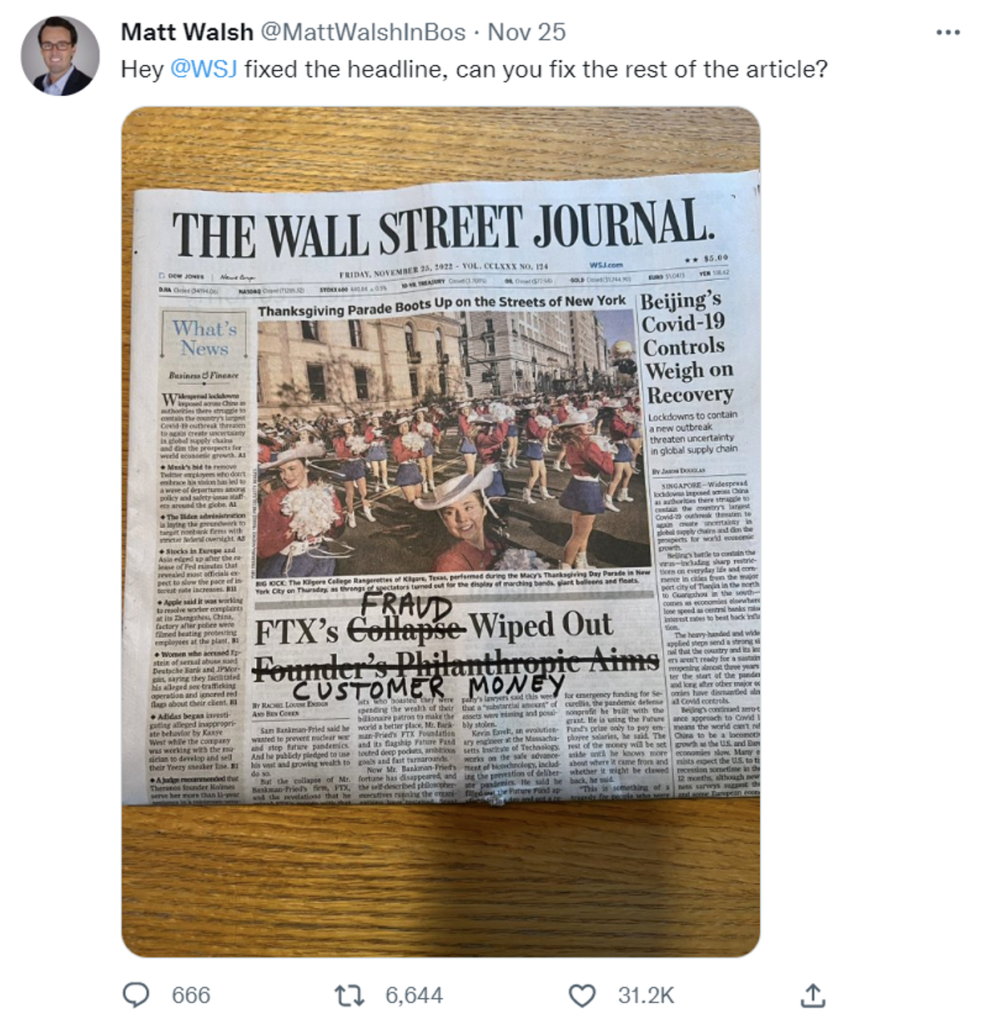
![]()
THIS TOO SHALL PASS
Pantera has invested through four similar “crypto winters”. While this FTX saga is incredibly frustrating, I’m sure…
“This too shall pass.”
— Ancient Persian adage
![]()
CRYPTO ISN’T THE PROBLEM :: YET ANOTHER LESSON IN CENTRALIZATION FAILURES AND WEAK REGULATION
By Jesus Robles, III, Content Associate, and Chia Jeng Yang (@chiajy2000), Investment Associate
FTX, at its peak, was once the second-largest centralized crypto-asset exchange by volume and trusted by many. In the span of two weeks, the organization collapsed, losing untold billions of dollars, and causing a substantial ripple effect that has led to serious problems for a number of major crypto-asset institutions and some bankruptcies.
Naturally one would ask, if you can’t trust one of the largest players in the exchange vertical, one that had every advantage going for its success, and one that was trusted by a large swath of the crypto-asset industry, including institutional players, then who or what can be trusted?
Since the early days of Bitcoin, the age-old wisdom has been, “don’t trust, verify”.
While our industry’s detractors have made a big deal of this failure, it doesn’t say anything about the overall promise of blockchain.
It’s important in times like these to take a step back, set any emotion or knee-jerk reaction aside, and evaluate the situation and potential impacts from a place of sobriety. A centralized financial institution that so happened to deal in crypto-assets — that also wasn’t held to the same regulatory standards as non-crypto traditional financial institutions — mishandled funds so badly that it imploded.
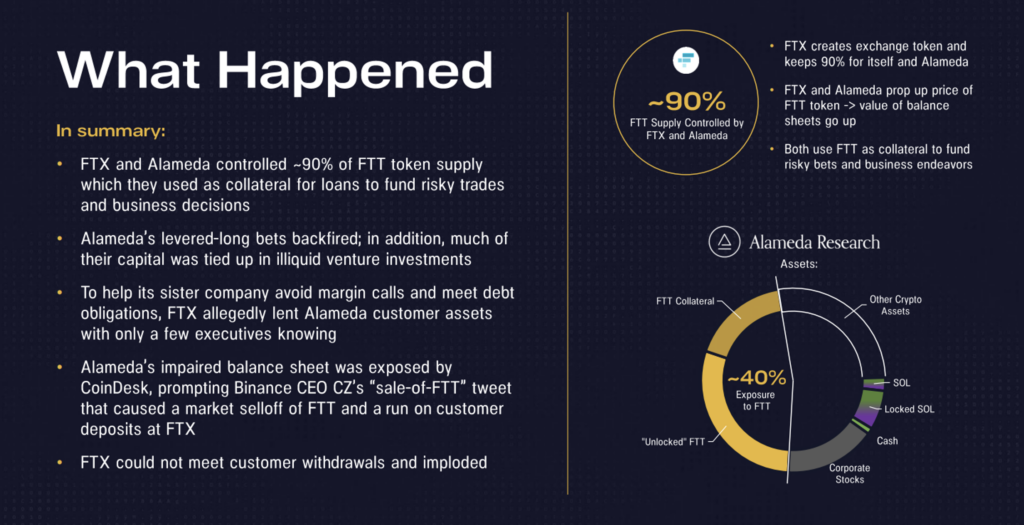
(see footnote [3] below.)
There is much speculation in the industry about the causes of the collapse. Recent charges filed against FTX CEO Sam Bankman-Fried (aka SBF) indicate wire fraud, securities fraud, money laundering, and related conspiracy charges. But in no conceivable way was the collapse due to the nature of crypto-assets the exchange held nor the technologies, protocols, and projects to which these crypto-assets are related (excluding FTT, the token FTX itself printed and leveraged).
This is just the same as the handful of other crypto-asset projects that ultimately succumbed to poorly managed or deliberately realized centralization risks. We think it is clear that the exchange’s collapse had nothing to do with blockchain.
‘“I have over 40 years of legal and restructuring experience. I have been the Chief Restructuring Officer or Chief Executive Officer in several of the largest corporate failures in history. I have supervised situations involving allegations of criminal activity and malfeasance (Enron). I have supervised situations involving novel financial structures (Enron and Residential Capital) and cross-border asset recovery and maximization (Nortel and Overseas Shipholding). Nearly every situation in which I have been involved has been characterized by defects of some sort in internal controls, regulatory compliance, human resources and systems integrity.
“Never in my career have I seen such a complete failure of corporate controls and such a complete absence of trustworthy financial information as occurred here. From compromised systems integrity and faulty regulatory oversight abroad, to the concentration of control in the hands of a very small group of inexperienced, unsophisticated and potentially compromised individuals, this situation is unprecedented.”
— FTX’s new CEO, John Ray, FTX Bankruptcy Fillings, November 17, 2022
The collapse was due to a bad organization, comprised of malicious and unqualified actors — centralization risks.
We believe it was also due in part to regulators not having the proper authority or tools to mobilize despite clues leading up to the collapse — per congressional mandate, only able to take an enforcement approach after damage is done rather than having the ability to pre-emptively protect users and funds. Another major factor that led to FTX’s collapse is U.S. regulatory uncertainty driving crypto-asset institutions and users off U.S. shores, where, like the Wild West, it’s just as easy to set up shop and operate as it is to be burned – regulatory woes.
We see two ways this crisis could have been averted:
1. Decentralization: If FTX were instead a decentralized exchange composed of smart contracting protocols a la DeFi, the exchange’s activities may have been fully transparent, auditable, and verifiable. In addition, user funds could have been self-custodialized. These features of some DeFi protocols preclude many potential avenues for fraud, money mismanagement, halting withdrawals, etc. — centralization risks. DeFi and blockchain are the answer to many classic centralization risks like these. Transparency, auditability, verifiability, self-custody, etc. are inherent features to some DeFi protocol architectures.
2. Regulation/Transparency: While we wait for increased DeFi adoption and integration, a robust, comprehensive regulatory framework — more suitable for how the crypto-asset industry has matured and the value at stake — would give us much better guarantees about institutional integrity (e.g., regulated traditional finance). Such a comprehensive regulatory framework would require transparency, audits, reporting, regular scrutiny, segregation of potentially interest-conflicting exchange components, etc., should be broad enough to protect all jurisdictional users, regardless if dealings are offshores, and endow regulatory agencies with the proper authority and tools to detect any issues well in advance.
We believe transparent, audited, regulated exchanges – like our portfolio companies Coinbase, Bitstamp, and similarly Circle — are good examples of institutional integrity in action – centralized financial institutions that have embraced and continue to champion satisfactory regulation, that operate safely, successfully, and are embracing advances in DeFi technology.
“Crypto regulation in the U.S. has been hard to navigate, and regulators have so far failed to provide a workable framework for how these services can be offered in a safe, transparent way. This means that a swathe of crypto-based financial products including lending, margin trading, short selling and other tools that are fully legal and regulated in traditional financial markets are all but outlawed in the U.S. Entrepreneurial teams building new decentralized products are afraid to build out of the U.S. for fear of litigation. They don’t want to break the rules, and right now they don’t know what the rules are.
“As a result, American consumers and advanced traders alike have been engaging with risky, offshore platforms outside the jurisdiction – and protection – of U.S. regulators. Today, more than 95% of crypto trading activity happens on overseas exchanges.
“Part of the reason FTX was able to do what it did was because it operates in the Bahamas, a tiny island country with very little regulatory oversight and ability to oversee financial services businesses. Did regulators force FTX to conduct itself in the way it did? No. But they did create a situation where FTX could take dangerous risks with no repercussions.”
— Brian Armstrong, Coinbase CEO, CNBC Op-Ed, November 11, 2022
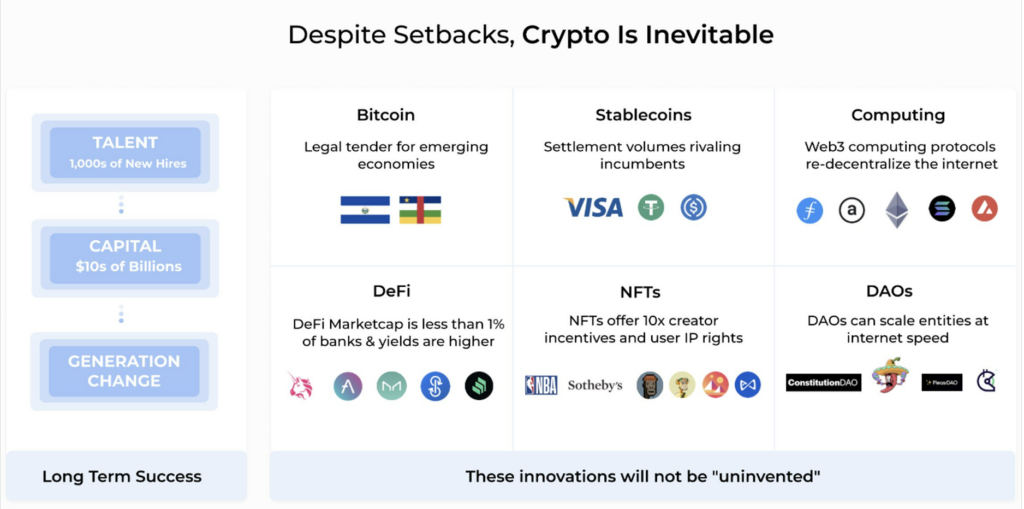
(@MessariCrypto, @twobitidiot)
CENTRALIZED FINANCE VS. DECENTRALIZED FINANCE (DEFI) :: FTX WAS A CENTRALIZATION FAILURE
By Jesus Robles, III, Content Associate
In our industry, the distinction between an entity, system, company, etc., being “centralized” and “decentralized” is important.
Long story short: centralized things like traditional financial institutions, everyday companies, etc. suffer from a handful of distinct risks — a single person or handful of people, for example, can choose to commit fraud, mismanage user funds, etc. leading to the demise of the company. The other members, users, etc. of the system have no say or transparency into those bad decisions but are still fully subject to the consequences.
For a decentralized system, a “complete failure of corporate controls and such a complete absence of trustworthy financial information”, as what happened in the case of FTX, would be inherently more difficult to achieve, because in decentralized systems like DeFi, transparency and self-custody are common features, and strictly enforced by transparent, unbiased smart contracts and code.
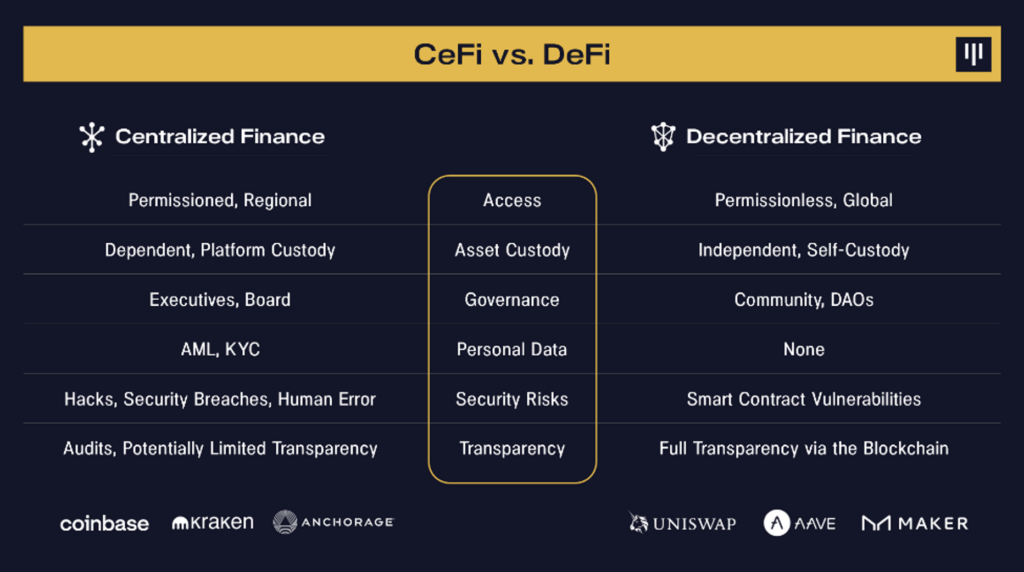
While its business was concerned with decentralized projects, tokens, etc., FTX fundamentally was a centralized institution. And its demise is certainly due to realized centralization risks of its small group of decision-making personnel choosing to jeopardize the institution through fraud, mismanaging funds, etc. For DeFi services, products, and tools, or perhaps in the case of DAO, decisions like this would need to be made democratically by all participants involved, and in full view of all said participants. And no rational majority would consent to fraud, mismanagement of funds, etc. Through democratization and transparency, we believe that DeFi would make it much harder for something like FTX to happen.
Centralized entities or systems are opaque — non-transparent — in that there is no ability to peer into their inner workings to be able to evaluate any potential issues from the outside. Recently released documents from FTX’s bankruptcy proceedings show how issues at the company had been festering for months prior to the implosion. Nobody had any idea what was going on until a few weeks ago when things began to bubble over the top onto social media. Had there been transparency into the goings-on, a comprehensive audit, etc., this crisis may have been identified early on and ultimately averted. For DeFi services, products, and tools, again this transparency is often baked-in, making it much more difficult for decisions like this to be made or for things to have festered for as long as they did in FTX’s case.
Centralized entities or systems, with respect to fintech, typically custody user assets for and, most importantly, separate from those users. While this has some benefits, if the entity or system was to fail, those assets would be subject to that failure or loss too. Indeed this was the case with FTX. Hundreds of thousands, perhaps millions, of users have lost countless millions, perhaps billions of dollars’ worth of crypto-assets and would be lucky to receive pennies on the dollar once bankruptcy proceedings complete. To give you some perspective, Mt. Gox bankruptcy proceedings have yet to resolve nine years after the fact. For decentralized financial services, products, and tools, depending on the particular protocol or system architecture, users can custody their own assets so in the case of project failure, they may be able to remove their funds from said service, product, or tool, avoiding loss.
Centralization failure led to the downfall of centralized FTX. Blockchain – and how it enables decentralization – is the solution, not the problem.
DEFI IS SUPERIOR :: CODE IS LAW
By Jesus Robles, III, Content Associate
DeFi, unlike opaque centralized finance, is not an empty house of cards. Its foundations are rock-solid, rooted in immutable code, and totally transparent. In some cases, DeFi removes human subjectivity entirely from, e.g., financing decisions. Parties agreeing to conduct transactions openly and transparently on the blockchain — as opposed to backroom deals by opaque, human (i.e., fallible), potentially interest-conflicted financial actors — is the vision we should be striving for, rather than clinging on to inefficient centralized financial systems.
DeFi has never “sinned”. The rules of engagement are coded into the smart contract. You do not need to trust a counterparty who may be incentivized to twist the truth, nor rely on trust to engage in financial transactions. The code just executes what both parties agreed to.
Trading volume on decentralized exchanges (DEXs) spiked in November following the collapse of FTX.
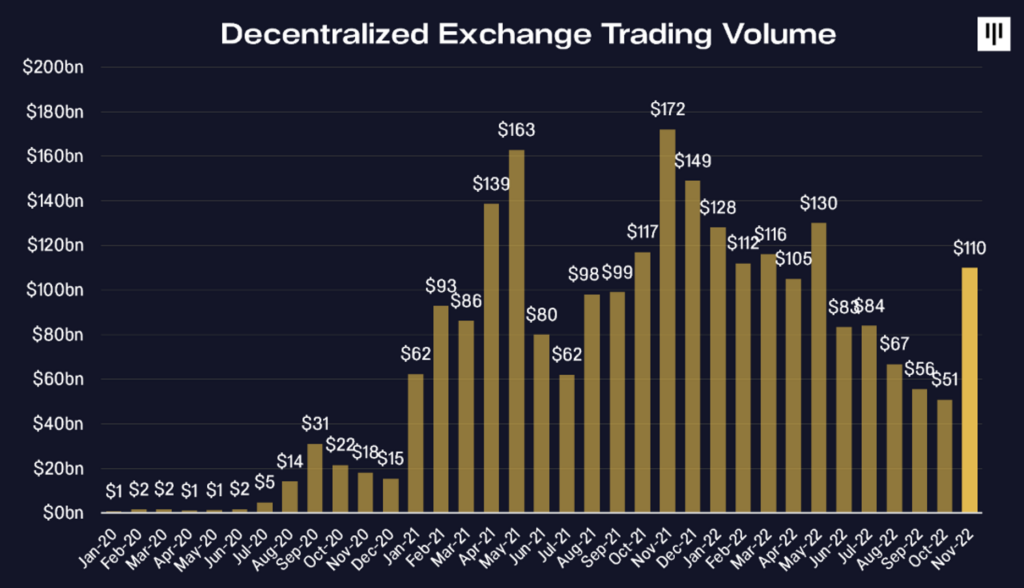
The most elegant proof of the superiority of DeFi over centralized finance/banking is in head-to-head competition.
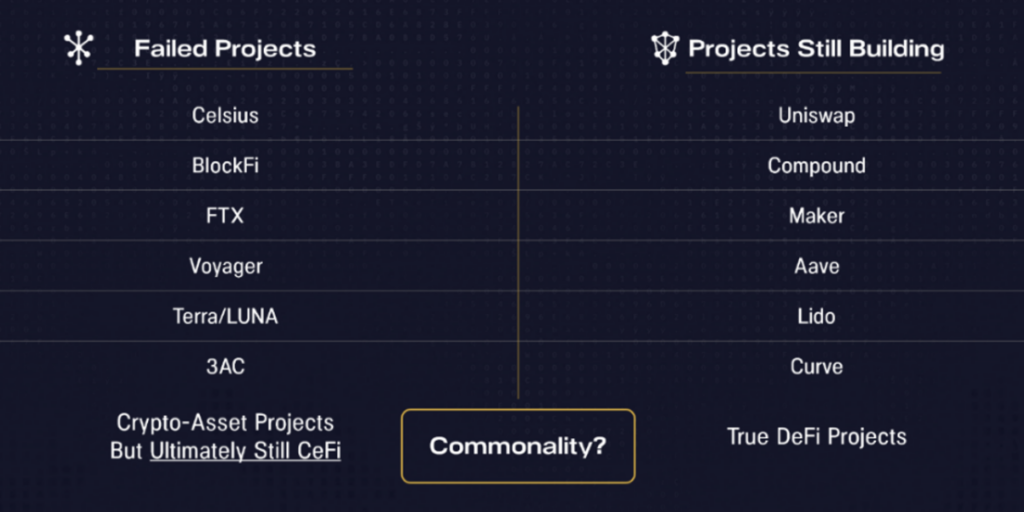
“Moreover, while the news of the collapse of FTX is empowering crypto skeptics, we would point out that all of the recent collapses in the crypto ecosystem have been from centralized players and not from decentralized protocols.”
— Steven Alexopoulos, JPMorgan Crypto Analyst, November 10, 2022
Defunct centralized finance companies like Celsius and BlockFi did business with counterparties that then invested those funds in DeFi protocols. What happened next was profound: these centralized finance companies were forced by smart contracts to pay back the DeFi protocols. In fact, you could say that DeFi, due to its discipline for over-collateralization, protects you from CeFi. Celsius was forced to prioritize paying down its $400+ million DeFi loans on Maker, Aave, and Compound to prevent its collateral from being liquidated. There is no ability to “re-structure”/renege on smart contracts. In DeFi “a deal is a deal” – you can’t back out. All centralized finance companies are forced by smart contracts to pay back the DeFi protocols.
On the flip side, centralized finance companies like FTX can lie to and ghost their own clients. These failed centralized finance companies (but just so happened to be crypto-asset focused) have gone silent to their customers. Unfortunately, their customers are unlikely to recover their money.
With DeFi, the outcome is different. Customers can monitor the protocols on the blockchain and be certain that the code will execute their transactions. Centralized finance clients have only vague website spin to believe in.
Part of why FTX failed was because Alameda allegedly had preferential accounts. Additionally, Alameda was allowed to trade with no auto-liquidation mechanics when they were overleveraged. There are no backdoors or preferential treatment in DeFi. Avoiding backdoor dealings and sweetheart deals was exactly what we pointed out in July’s Blockchain Letter as something that DeFi is structurally unable to allow (as opposed to CeFi). In DeFi, the same rules apply to everyone and protocols cannot structurally deviate from them.
We believe DeFi is the future of finance, and although it has some of its own unique early hiccups, it most certainly is the solution for the risks and limitations of centralized finance of old, such as the lack of transparency, the risks of backdoor dealings, sweethearts deals, insolvency, money mismanagement, fraud, etc. This is part of why DeFi is emphasized in our broader investment thesis.
We believe the industry will continue to push towards decentralized finance protocols that remove much of the counterparty risk that is inherent to dealing with centralized companies.
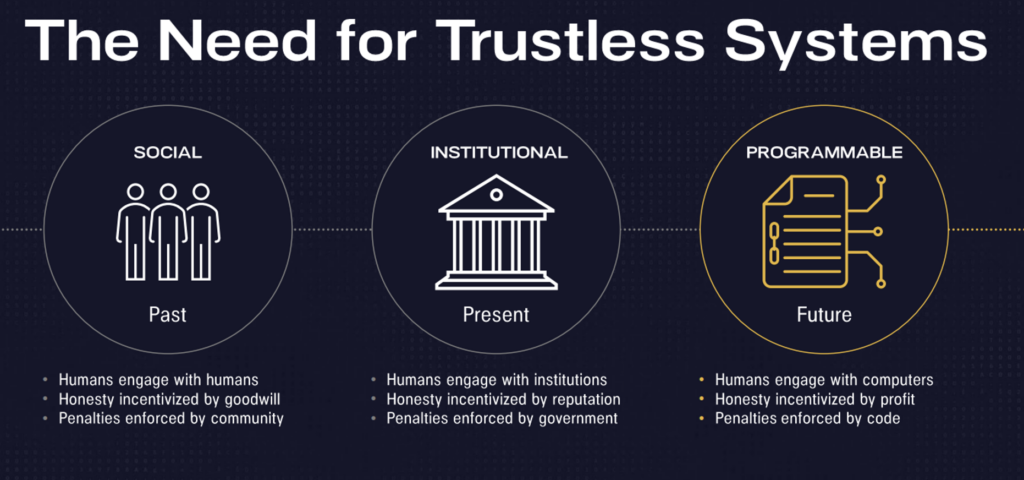
STRUCTURALLY SAFER FINANCE :: REGULATED EXCHANGES[4]
By Jesus Robles, III, Content Associate, and Chia Jeng Yang (@chiajy2000), Investment Associate
While DeFi is in some ways at odds with CeFi, coexistence of these generations of fintech will be the norm rather than DeFi “completely replacing” CeFi.
That said, there can and must be improvements to CeFi as it pertains to crypto-assets, namely better regulation. Regulated entities are generally safer and where we believe regulation has created structurally safer and net better financial institutions, they should be embraced.
Regulated CeFi exchanges can and do work great. There’s something to be said about well-regulated, fully transparent, tightly-ran centralized crypto-asset exchanges and on-ramps — like Pantera portfolio companies Coinbase, Bitstamp, and Circle.
1. Coinbase

Coinbase, a public company, has embraced common sense regulation and was amongst the first entities to obtain the BitLicense from the New York Department of Financial Services (NYDFS) in 2017. Coinbase also maintains licensure in nearly every U.S. state and continues to seek and obtain approval from international regulatory bodies to support platform growth and expansion.
In June 2021, the German Federal Financial Supervisory Authority (BaFin) awarded Coinbase Germany GmbH a license for crypto custody and trading, under the new licensing regime introduced in January 2020. The BaFin licensing framework is the first of its kind in the European Union, and Coinbase Germany was the first company to be issued such a license.
With all of its regulatory prudence, Coinbase is the current second-largest crypto-asset exchange by volume, is publicly traded, and is one of the most successful and prominent companies in the industry. Regulated exchanges working great!
2. Bitstamp

We believe the longest-running crypto-asset exchange Bitstamp is one of the industry’s leaders in compliance and regulation. Bitstamp:
-
-
-
-
Holds assets 1:1 in custody with licensed trust company BitGo and with other regulated banking institutions.
-
Is covered by crime insurance.
-
Is currently working with BitGo and its Big Four auditor, Ernst & Young, to publish a Proof-of-Reserves transparency report as of the FTX incident.
-
Was the first crypto exchange to receive a license in Europe: the EBA Payment Institution License in Luxembourg in 2016.
-
Is one of a few companies with an NYDFS BitLicense to operate in New York State.
-
Is audited yearly by Ernst & Young for the past four years.
-
And holds capital reserves as required by the NYDFS.
-
-
-
Bitstamp currently reigns as the fifth-largest crypto-asset exchange by volume[5] and saw its market share increase materially as users fled sketchy off-shore exchanges in favor of safer, regulated entities (see table “Cryptocurrency Exchange Market Share” above). Regulated exchanges working great!
3. Circle

Less of an exchange and more of an on-ramp, portfolio company Circle offers USDC (U.S. dollar coin), a fully-reserved stablecoin. Every digital dollar of USDC on the internet is 100% backed by cash and short-dated U.S. treasuries, so that it’s always redeemable 1:1 for U.S. dollars. Stablecoins are crypto-assets backed by reserve currencies, intended to take advantage of the decentralization benefits of blockchain while mitigating volatility risks typical of crypto-asset markets.
Circle USDC reserves are held in the custody and management of leading U.S. financial institutions, including BlackRock and BNY Mellon. Each month, Grant Thornton LLP, one of America’s largest audit, tax, and advisory firms, provides third-party assurance as to the size of the USDC reserve.
Circle is regulated as a licensed money transmitter under U.S. state law just like PayPal, Stripe, and Apple Pay. Circle’s financial statements are audited annually and subject to review by the SEC.
In the U.S., Circle is regulated by the Financial Crimes Enforcement Network (FinCEN), a bureau of the U.S. Department of Treasury, as a Money Services Business. It is also licensed as a money transmitter in certain states and actively engaging with other states on receiving additional such licenses.
Beyond the U.S., Circle is regulated as an Electronic Money Institution (EMI) by the Financial Conduct Authority, held accountable to the Treasury (responsible for the UK’s financial system) and to the Parliament. Because it is an EMI, Circle is allowed to passport its license across the European Economic Area.
Most recently, Circle has received In-Principle Approval as a Major Payments Institution License holder from the Monetary Authority of Singapore (MAS). This allows Circle to offer digital payment token products, cross-border, and domestic transfer services in the city-state, giving rise to a new generation of financial services and commerce applications.
Circle closely monitors the actions of government authorities to ensure it meets any future obligations.
With all of its regulatory prudence, Circle is one of the longest-running and most trusted crypto-asset on-ramps, spearheads stablecoin adoption, and regularly champions for more suitable industry regulation.
![]()
REGULATION VS. DEFI[6]
By Jesus Robles, III, Content Associate, and Chia Jeng Yang (@chiajy2000), Investment Associate
Regulated entities are generally safer and where we believe regulation has created structurally safer and net better financial institutions, they should be embraced. Regulation is one of many tools to enforce structures of safety and help catch malicious actors — but there are limitations. Legal structures and regulation should be seen as good but incomplete means of safety, merely a means to an end for “Structurally Safer Finance”.

In an incredibly adversarial, open, global environment, DeFi must protect its users with code alone, and for the purposes of trustlessness, nothing is more mechanical, structural, or sound than code.
Despite the ongoings of FTX, many DeFi protocols have simply functioned the same as before, many hardened by previous crises.
“We should talk about this decentralized nature, because that poses a whole different set of questions, especially for a regulator. We are accustomed to being hands-on, and I won’t speak about my colleagues at banking regulators but, banking examiners are embedded in banks. Their office is the bank they regulate. DeFi and DAOs pose a lot of very difficult questions about what role the regulator has.”
— Chairman Rostin Behnam, CFTC, Princeton DeCenter Inaugural Summit, November 30, 2022
REGULATORY OUTLOOK :: INDUSTRY & TECHNOLOGY LEGITIMAZATION AHEAD
“While this is certainly a major short-term setback, we see the widely publicized collapse of FTX as potentially dramatically accelerating the timeline to which crypto-related regulation will be ushered in (similar to new banking regulation which followed the GFC (global financial crisis)).
“As a result, we see the news surrounding FTX as one step back, but one that could prove to be the catalyst to move the crypto economy two steps forward (further unlocking the utility value of blockchain). In fact, we see the establishment of a regulatory framework as the needed catalyst to massively ramp the institutional adoption of crypto.”
— Steven Alexopoulos, JPMorgan Crypto Analyst, November 10, 2022
PANTERA SPECIAL CALL: THE FTX FALLOUT
On Friday, November 9, Pantera held a special call for investors to discuss what happened, how we responded, our approach to risk management, the current state of things, and our future outlook/key takeaways. In case you missed it, you can find a video of the conversation here.
![]()
RECENT PANTERA PLATFORM INITIATIVES[7]
We do much more for our portfolio companies than invest. Read about two recent Pantera platform initiatives by clicking on the links below:
![]()
NEW PORTFOLIO COMPANY INVESTMENTS
By Tony Sakich (@Tony_Swish), Director of Marketing & Communications
ForDefi Takes The Guesswork Out Of Crypto Transfer Security
We’ve all been there. You’re about to send someone crypto, so you double and triple check every aspect of the transaction. Is the denomination correct? Is the receiver’s address correct?
Wouldn’t it be nice to do a “test run” of the transaction to ensure that everything works perfectly before you commit to that final click?
ForDefi’s Transfer Simulator translates complicated smart contracts into language users can understand, simulating every transaction in advance and independently verifying dApp names.
Security for Institutional Users
The ForDefi Wallet also enables an institution’s private keys to be distributed while still allowing the user to easily connect with dApps. This MPC key management scheme protects institutional users from any single point-of-failure and is the only institutional MPC wallet built for firms transacting across blockchains.
Learn more at ForDefi.com and follow the project on Twitter @FordefiHQ.
Jumbo Exchange Simplified NEAR
One of the most consistent challenges associated with DeFi is the difficult learning curve for new users.
Jumbo aims to create a familiar experience with baked-in security, a decentralized AML approach, and sleek design choices that coalesces transparency and ecosystem growth to offer a new vision for what a decentralized exchange (DEX) experience should look like.
Jumbo began development in late 2021 and is one of the most popular decentralized exchanges on the NEAR Protocol featuring instant swaps, staking, seamless pool transition, and permissionless liquidity pools.
Learn more about NEAR at NEAR.org.
Check out Jumbo.Exchange and follow Jumbo on Twitter @jumbo_exchange.
![]()
Good riddance to 2022.
Wishing you all the best for 2023!

“Put the alternative back in Alts”
CONFERENCE CALLS[8]
Our investment team hosts monthly conference calls to help educate the community on blockchain. The team discusses important developments that are happening within the industry and will often invite founders and CEOs of leading blockchain companies to participate in panel discussions. Below is a list of upcoming calls for which you can register via this link.
Pantera Fund V Launch Call
Fund V offers exposure to the full spectrum of blockchain assets. Like its predecessor, Blockchain Fund (IV), the venture-style fund will invest in venture equity, early-stage tokens, and liquid tokens.
Tuesday, January 17, 2023 9:00am PDT / 18:00 CET / 1:00am Singapore Standard Time
Please register in advance via this link:
https://panteracapital.com/future-conference-calls/
Pantera Liquid Token Fund Investor Call
Tuesday, January 24, 2023 9:00am PDT / 18:00 CET / 1:00am Singapore Standard Time
Open only to Limited Partners of the fund.
Pantera Early-Stage Token Fund Ltd Investor Call
Tuesday, January 31, 2023 7:00am PDT / 16:00 CET / 11:00pm Singapore Standard Time
Open only to Limited Partners of the fund.
Pantera Early-Stage Token Fund Investor Call
Tuesday, January 31, 2023 9:00am PDT / 18:00 CET / 1:00am Singapore Standard Time
Open only to Limited Partners of the fund.
Investing in Blockchain Conference Call
Tuesday, February 7, 2023 9:00am PDT / 18:00 CET / 1:00am Singapore Standard Time
Please register in advance via this link:
https://panteracapital.com/future-conference-calls/
Pantera Fund V Launch Call
Fund V offers exposure to the full spectrum of blockchain assets. Like its predecessor, Blockchain Fund (IV), the venture-style fund will invest in venture equity, early-stage tokens, and liquid tokens.
Tuesday, February 14, 2023 9:00am PDT / 18:00 CET / 1:00am Singapore Standard Time
Please register in advance via this link:
https://panteracapital.com/future-conference-calls/
PORTFOLIO COMPANY OPEN POSITIONS[9]
Interested in joining one of our portfolio companies? The Pantera Jobs Board features 1,500+ openings across a global portfolio of high-growth, ambitious teams in the blockchain industry. Our companies are looking for candidates who are passionate about the impact of blockchain technology and digital assets. Our most in-demand functions range across engineering, business development, product, and marketing/design.
Our portfolio companies are actively hiring for the following roles:
-
0x Labs – Software Engineer Backend (Remote)
-
CoinDCX – Front End Engineer (Bengaluru, India)
-
Waterfall – Software Engineer (New York)
-
Injective Protocol – Rust Developer (Remote)
-
bloXroute Labs – Lead Software Engineer (Tel Aviv, Israel)
-
Brine Finance – Infrastructure Engineer (Bangalore, India)
-
Alchemy – Solidity Smart Contract Engineer (New York or San Francisco)
-
Ondo Finance – Staff Smart Contract Engineer, Solidity (Remote)
-
NEAR Foundation – Chief of Staff (Remote)
-
Audius – Software Engineer Full Stack (Remote)
-
Rift Finance – Core Engineer (Hybrid, New York)
-
Alchemy – Engineering Manager (New York or San Francisco)
-
Circle – Director, Financial Operations (Remote)
-
Protocol Labs – Sr. Product Manager, Infrastructure (Remote)
-
Hyperspace – Mobile Engineer, React Native (New York)
-
Abra – Quantitative Developer – (Remote)
-
Pintu – Sr. Software Engineer – (Hybrid Remote)
-
API3 – Oracle Developer (Remote)
-
Aurora – Legal Counsel (Remote)
-
StarkWare – Site Reliability Engineer (Netanya, Israel)
Visit the Jobs Board here and apply directly or submit your profile to our Talent Network here to be included in our candidate database.
[1] Important Disclosures – Certain Sections of this Letter Discuss Pantera’s Advisory Services. Certain sections of this letter discuss the investment advisory business of Pantera Capital Management Puerto Rico LP and its affiliates (“Pantera”), while other sections of the letter consist solely of general market commentary and do not relate to Pantera’s investment advisory business. Pantera has inserted footnotes throughout the letter to identify these differences. This section discusses Pantera’s advisory services, and differences among sections are marked accordingly. Nothing contained herein should be construed as a recommendation to invest in any security or to undertake an investment advisory relationship, or as any form of investment, legal, tax, or financial advice or recommendation. Prospective investors should consult their own advisors prior to making an investment decision. Pantera has no duty to update these materials or notify recipients of any changes. Opinions and forward-looking statements are not a guarantee or representation that Pantera or any of its clients will achieve any strategy, objectives, or other plans. Past performance is not necessarily indicative of or a guarantee of future results.
[2] Important Disclosures — General Market Commentary / No Offer of Advisory Services: This section provides educational content and general market commentary. Except for specifically marked sections of this this letter, no statements included herein relate to Pantera’s investment advisory services, nor does any content herein reflect or contain any offer of new or additional investment advisory services. Opinions and other statements contained herein do not constitute any form of investment, legal, tax, financial or other advice or recommendation.
[3] Important Disclosures: Materials (the “Materials”) have been prepared by Pantera Capital Management Puerto Rico LP and its affiliates (“Pantera”) in order to present certain information to the recipients, including existing investors in funds managed by Pantera (the “Funds”). This document is presented for informational purposes only – nothing contained herein should be construed as an offer of advisory services and parties reviewing these materials should not rely upon statements made herein in making any investment decisions, including, but not limited to, a decision to invest in a Fund. Included in the materials are statements related to the evolving situation involving the FTX bankruptcy and related matters. These matters are rapidly evolving and Pantera continues to assess the impact of such events on its portfolios and operations. Statements made herein are subject to change and Pantera is under no obligation to provide updates or notice of any changes to any viewer of these Materials.
[4] Important Disclosures – This Section Discusses Pantera’s Advisory Services. Information contained in this section relates to Pantera’s investment advisory services. Nothing contained herein should be construed as a recommendation to invest in any security or to undertake an investment advisory relationship, or as any form of investment, legal, tax, or financial advice or recommendation. Prospective investors should consult their own advisors prior to making an investment decision. Pantera has no duty to update these materials or notify recipients of any changes.
[5] According to exchange data from coinmarketcap.com, November 16th, 2022.
[6] Important Disclosures — General Market Commentary / No Offer of Advisory Services: This section provides educational content and general market commentary. Except for specifically marked sections of this this letter, no statements included herein relate to Pantera’s investment advisory services, nor does any content herein reflect or contain any offer of new or additional investment advisory services. Opinions and other statements contained herein do not constitute any form of investment, legal, tax, financial or other advice or recommendation.
[7] Important Disclosures – This Section Discusses Pantera’s Advisory Services. Information contained in this section relates to Pantera’s investment advisory services. Nothing contained herein should be construed as a recommendation to invest in any security or to undertake an investment advisory relationship, or as any form of investment, legal, tax, or financial advice or recommendation. Prospective investors should consult their own advisors prior to making an investment decision. Pantera has no duty to update these materials or notify recipients of any changes.
[8] Important Disclosures – This Section Discusses Pantera’s Advisory Services. Information contained in this section relates to Pantera’s investment advisory business. Nothing contained herein should be construed as a recommendation to invest in any security or to undertake an investment advisory relationship, or as any form of investment, legal, tax, or financial advice or recommendation. Prospective investors should consult their own advisors prior to making an investment decision. Pantera has no duty to update these materials or notify recipients of any changes.
[9] This section does not relate to Pantera’s investment advisory services. The inclusion of an open position here does not constitute an endorsement of any of these companies or their hiring policies, nor does this reflect an assessment of whether a position is suitable for any given candidate.
This letter is an informational document that primarily provides educational content and general market commentary. Except for certain sections specifically marked in this letter, no statements included herein relate specifically to investment advisory services provided by Pantera Capital Management Puerto Rico LP or its affiliates (“Pantera”), nor does any content herein reflect or contain any offer of new or additional investment advisory services. Nothing contained herein constitutes an investment recommendation, investment advice, an offer to sell, or a solicitation to purchase any securities in Funds managed by Pantera (the “Funds”) or any entity organized, controlled, or managed by Pantera and therefore may not be relied upon in connection with any offer or sale of securities. Any offer or solicitation may only be made pursuant to a confidential private offering memorandum (or similar document) which will only be provided to qualified offerees and should be carefully reviewed by any such offerees prior to investing.
This letter aims to summarize certain developments, articles, and/or media mentions with respect to bitcoin and other cryptocurrencies that Pantera believes may be of interest. The views expressed in this letter are the subjective views of Pantera personnel, based on information that is believed to be reliable and has been obtained from sources believed to be reliable, but no representation or warranty is made, expressed or implied, with respect to the fairness, correctness, accuracy, reasonableness, or completeness of the information and opinions. The information contained in this letter is current as of the date indicated at the front of the letter. Pantera does not undertake to update the information contained herein.
This document is not intended to provide, and should not be relied on for accounting, legal, or tax advice, or investment recommendations. Pantera and its principals have made investments in some of the instruments discussed in this communication and may in the future make additional investments, including taking both long and short positions, in connection with such instruments without further notice.
Certain information contained in this letter constitutes “forward-looking statements”, which can be identified by the use of forward-looking terminology such as “may”, “will”, “should”, “expect”, “anticipate”, “target”, “project”, “estimate”, “intend”, “continue”, “believe”, or the negatives thereof or other variations thereon or comparable terminology. Due to various risks and uncertainties, actual events or results or the actual policies, procedures, and processes of Pantera and the performance of the Fund may differ materially from those reflected or contemplated in such forward-looking statements, and no undue reliance should be placed on these forward-looking statements, nor should the inclusion of these statements be regarded as Pantera’s representation that the Fund will achieve any strategy, objectives, or other plans. Past performance is not necessarily indicative of or a guarantee of future results.
It is strongly suggested that any prospective investor obtain independent advice in relation to any investment, financial, legal, tax, accounting, or regulatory issues discussed herein. Analyses and opinions contained herein may be based on assumptions that if altered can change the analyses or opinions expressed. Nothing contained herein shall constitute any representation or warranty as to future performance of any financial instrument, credit, currency rate, or other market or economic measure.
This document is confidential, is intended only for the person to whom it has been provided, and under no circumstance may a copy be shown, copied, transmitted, or otherwise given to any person other than the authorized recipient.
